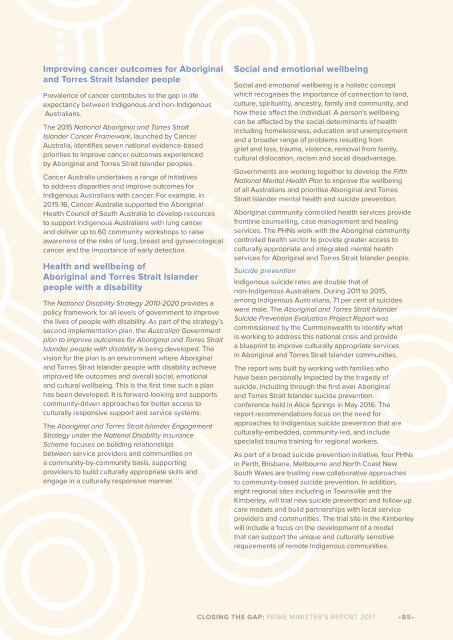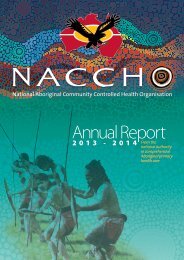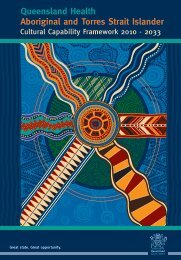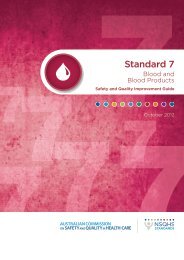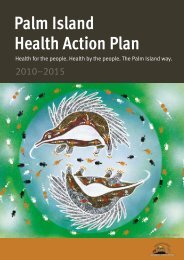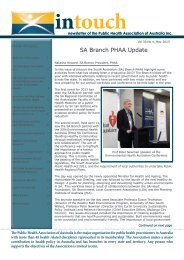CLOSING THE GAP
ctg-report-2017
ctg-report-2017
Create successful ePaper yourself
Turn your PDF publications into a flip-book with our unique Google optimized e-Paper software.
Improving cancer outcomes for Aboriginal<br />
and Torres Strait Islander people<br />
Prevalence of cancer contributes to the gap in life<br />
expectancy between Indigenous and non-Indigenous<br />
Australians.<br />
The 2015 National Aboriginal and Torres Strait<br />
Islander Cancer Framework, launched by Cancer<br />
Australia, identifies seven national evidence-based<br />
priorities to improve cancer outcomes experienced<br />
by Aboriginal and Torres Strait Islander peoples.<br />
Cancer Australia undertakes a range of initiatives<br />
to address disparities and improve outcomes for<br />
Indigenous Australians with cancer. For example, in<br />
2015-16, Cancer Australia supported the Aboriginal<br />
Health Council of South Australia to develop resources<br />
to support Indigenous Australians with lung cancer<br />
and deliver up to 60 community workshops to raise<br />
awareness of the risks of lung, breast and gynaecological<br />
cancer and the importance of early detection.<br />
Health and wellbeing of<br />
Aboriginal and Torres Strait Islander<br />
people with a disability<br />
The National Disability Strategy 2010-2020 provides a<br />
policy framework for all levels of government to improve<br />
the lives of people with disability. As part of the strategy’s<br />
second implementation plan, the Australian Government<br />
plan to improve outcomes for Aboriginal and Torres Strait<br />
Islander people with disability is being developed. The<br />
vision for the plan is an environment where Aboriginal<br />
and Torres Strait Islander people with disability achieve<br />
improved life outcomes and overall social, emotional<br />
and cultural wellbeing. This is the first time such a plan<br />
has been developed. It is forward-looking and supports<br />
community-driven approaches for better access to<br />
culturally responsive support and service systems.<br />
The Aboriginal and Torres Strait Islander Engagement<br />
Strategy under the National Disability Insurance<br />
Scheme focuses on building relationships<br />
between service providers and communities on<br />
a community-by-community basis, supporting<br />
providers to build culturally appropriate skills and<br />
engage in a culturally responsive manner.<br />
Social and emotional wellbeing<br />
Social and emotional wellbeing is a holistic concept<br />
which recognises the importance of connection to land,<br />
culture, spirituality, ancestry, family and community, and<br />
how these affect the individual. A person’s wellbeing<br />
can be affected by the social determinants of health<br />
including homelessness, education and unemployment<br />
and a broader range of problems resulting from<br />
grief and loss, trauma, violence, removal from family,<br />
cultural dislocation, racism and social disadvantage.<br />
Governments are working together to develop the Fifth<br />
National Mental Health Plan to improve the wellbeing<br />
of all Australians and prioritise Aboriginal and Torres<br />
Strait Islander mental health and suicide prevention.<br />
Aboriginal community controlled health services provide<br />
frontline counselling, case management and healing<br />
services. The PHNs work with the Aboriginal community<br />
controlled health sector to provide greater access to<br />
culturally appropriate and integrated mental health<br />
services for Aboriginal and Torres Strait Islander people.<br />
Suicide prevention<br />
Indigenous suicide rates are double that of<br />
non-Indigenous Australians. During 2011 to 2015,<br />
among Indigenous Australians, 71 per cent of suicides<br />
were male. The Aboriginal and Torres Strait Islander<br />
Suicide Prevention Evaluation Project Report was<br />
commissioned by the Commonwealth to identify what<br />
is working to address this national crisis and provide<br />
a blueprint to improve culturally appropriate services<br />
in Aboriginal and Torres Strait Islander communities.<br />
The report was built by working with families who<br />
have been personally impacted by the tragedy of<br />
suicide, including through the first ever Aboriginal<br />
and Torres Strait Islander suicide prevention<br />
conference held in Alice Springs in May 2016. The<br />
report recommendations focus on the need for<br />
approaches to Indigenous suicide prevention that are<br />
culturally-embedded, community-led, and include<br />
specialist trauma training for regional workers.<br />
As part of a broad suicide prevention initiative, four PHNs<br />
in Perth, Brisbane, Melbourne and North Coast New<br />
South Wales are trialling new collaborative approaches<br />
to community-based suicide prevention. In addition,<br />
eight regional sites including in Townsville and the<br />
Kimberley, will trial new suicide prevention and follow-up<br />
care models and build partnerships with local service<br />
providers and communities. The trial site in the Kimberley<br />
will include a focus on the development of a model<br />
that can support the unique and culturally sensitive<br />
requirements of remote Indigenous communities.<br />
<strong>CLOSING</strong> <strong>THE</strong> <strong>GAP</strong>: PRIME MINISTER'S REPORT 2017<br />
•85•


